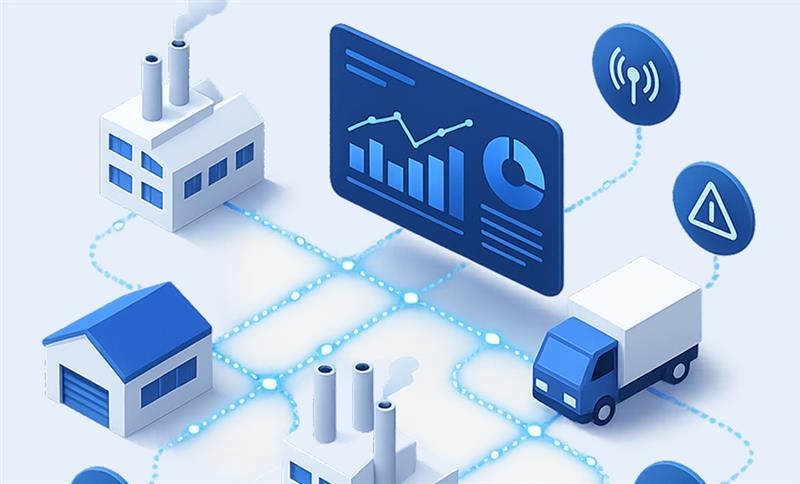At a Glance
- Today’s chemical industry is all about enhanced visibility and accountability.
- Dealing with varying laws and regulations for different regions, fluctuating and lack of visibility across the board requires advanced solutions.
- Integrating advanced technologies can reduce waste, unearth new products, find new markets and enhance a company’s status.
Change in Operations
Chemical companies, especially pharmaceutical companies, are seeing an increase in the need for global reach.
Since its first discovery, the effect Covid-19 has had on supply chains has been severe, regardless of product. As with many problems, this disease has also created numerous opportunities, especially for the chemical industry. Major companies continue to expand operations, delivering their products worldwide, including former “third world” countries with a growing thirst for everything from antiviral medications and cleaning products to beauty supplies.
“The chemical industry touches nearly every good-producing sector, making an estimated $5.7 trillion contribution to world Gross Domestic Product (GDP) through direct, indirect and induced impacts, equivalent to seven percent of the world’s GDP, and supporting 120 million jobs worldwide.”
This data from the ICCA shows a considerable market share, making it safe to say that the chemical industry is looking at a secure future. Globalization, however, requires dealing with unique challenges and roadblocks, especially regarding the movement of chemicals from supplier to producer and consumer. Today’s supply chain management won’t work in silos. That idea is no longer sustainable or feasible. Today’s global marketplace requires expanded thinking, and that means going digital.
Today, planning a chemical supply chain means using effective, profitable methods where customers, suppliers, parts vendors, shippers, sales and production facilities are connected, regardless of their physical locations. Modern software like Microsoft Dynamics 365’s suite of modular programs can help chemical companies use modern digital methods and enhance the operational efficiency of their supply chain.
In this article, we will look at some of the key supply chain challenges in the chemical industry today and how technology is playing a key role in enabling forward-thinking companies prosper.
Top Challenges in Chemical Supply Chain
Every company has its own set of challenges, such as the size of the company, the locations of its manufacturing units and the structure of its supply chain. Regardless of an individual firm’s situation, all chemical manufacturing companies face common supply chain issues.
Typical chemical industry supply chain challenges include:
- Distributing chemicals and related raw material in different countries. Companies struggle to keep up with the laws and regulations of varying regions. What’s safe and acceptable in one country may violate worker safety laws in another. This is especially true when it comes to hazardous chemicals.
- Existing chemical supply chain management can fall prey to manual errors and miscommunications, causing potential safety hazards and monetary loss.
- The bottom line often depends on a company’s ability to source raw materials. When prices for essential materials fluctuate, the entire supply chain can be affected.
- Tracking material pricing and delivery details create a lot of data. This includes information regarding the chemicals, their compositions, material pricing, safety precautions, distribution lists, and more. Managing this information is a top concern for chemical supply chain managers.
Looking to Improve Your Chemical Supply Chain? Book To learn more, request a consultation.
Figure: 1 Supply Chain Challenges in Chemical Industry

3 Ways Technology is Reshaping the Chemical Supply Chain
01.Technology Enables Creating a Connected System
Today’s world is much more connected than it used to be. Systems are linked with smart devices, modern sensors and powerful software running it all. With these sophisticated enterprise resource planning systems in place, it becomes much easier to organize your chemical company’s supply chain. Modern systems can generate an alert when a violation occurs. These automatic alerts reduce manual errors or oversights.
A connected ecosystem provides top-to-bottom visibility in the supply chain, giving top-level decision-makers a clear picture and greater transparency across the board. This enables better accountability and the ability to find solutions to common problems and bottlenecks.
Figure: 2 New Technologies in Supply Chain

02.AI Helps Create a Failsafe Supply Chain
Chemical supply chain management is highly susceptible to changes in prices of raw materials. To stay ahead of the curve, companies need to stay up to date on global, as well as regional changes to predict how these changes will impact their supply chains.
Artificial intelligence(AI) enabled solutions can analyze data in real-time, letting decision makers know what is likely to happen, how it will affect them and most importantly, what they can do to avoid or reduce any impact. This software can help these companies make necessary modifications to their supply chain strategy on the fly.
03.Using Cloud Computing to Manage Supply Chain Data
Data collation, cataloging and analysis, are intricate tasks. When performed by people, they can be prone to manual errors. However, with progressive technological tools like Microsoft Dynamics 365 Supply Chain Management, companies can store unlimited data and analyze it much more efficiently. This categorized and analyzed data can be leveraged to generate insights that help fortify the company’s supply chain for smooth transitions and better efficiency.
Supply chains are the backbone of many industries. The chemical industry needs to adapt to changing times, and make use of the right technologies to harness maximum benefits.
Key Takeaways
Like any industry, the chemical industry is witnessing the need for change in its supply chain model. With the help of cutting-edge technological tools and applications, chemical supply chain management can be overhauled and optimized for enhanced efficiency. Is your supply chain ready for a change?
References: Chemical Supply Chain: Challenges and Opportunities in the Era of AI







